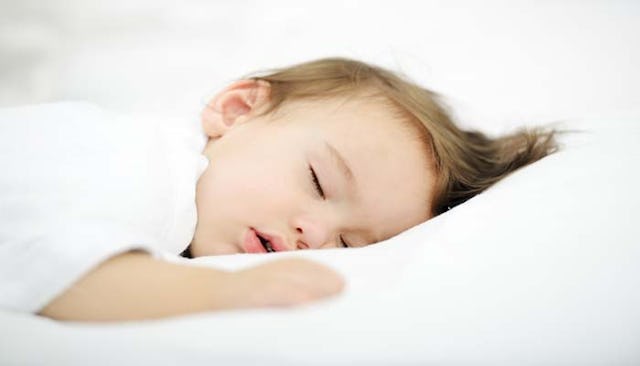New Research Says 'Cry It Out' Doesn't Harm Babies -- And They Sleep Better

‘Cry it out’ sleep method doesn’t harm babies, research finds
A new study says “graduated extinction,” the practice of allowing an infant to cry itself to sleep, commonly known as “cry it out” or “The Ferber Method” will not cause any lasting psychological damage.
In a study of 43 infants between the ages of six months and 16 months, those who were sleep-trained with the cry it out method didn’t show any emotional, behavioral, or parental attachment issues — and woke less during the night than infants who weren’t. The study also tested a sleep training method known as “bedtime fading.” This is when a child’s bedtime is pushed later and later with the hope that the child will be sleepier and fall asleep easier. Both sleep training methods worked. (But the former allowed parents to watch Scandal uninterrupted, so is clearly superior.) The infants whose parents used them slept longer and woke less during the night than those whose parents were in the control group and stuck to their own routines, like rocking children to sleep.
One of the goals of the study published today in Journal Pediatrics was to test the claims a previous study made that infants who were sleep trained with the sleep extinction method had elevated stress hormones. This new research showed no elevated stress hormones in infants during the treatment, or 12 months after.
Make up your minds, researchers. We’d like to know how badly we’re screwing up our children. Is that too much to ask?
“It looks like you’ve got two effective treatments that don’t necessarily lead to negative outcomes,” Michael Gradisar, the lead author of the study and an associate professor at Flinders University in Australia and director of the university’s Child and Adolescent Sleep Clinic told CBC.
I’m the biggest proponent of sleep training ever, because I never did it. I also haven’t had a full night’s sleep or evening completely alone in five years. God knows we could all use more sleep and less guilt. If sleep training is better for everyone, why aren’t we doing it?
Probably because we can’t stand to hear our kids cry.
And that’s okay.
There is no study that’s going to change the way someone parents. Either you can deal with the sounds of your sobbing child or you can’t. Believe me I wish I was in the former lot. I just wasn’t. I whispered apologies into my child’s ears the first time I let him sob through a cry-it-out attempt, and couldn’t bear to do it again. I’m not proud.
There’s going to be a study in the next few months that disagrees with this one and says the complete opposite. That’s just how parenting studies work. So the take away from this study should be — do you. If sleep training your child causes you immeasurable stress – don’t do it. You’ll probably sleep less, but whatever. If sleep training works for you, do it. Your kid may actually be sleeping better and you get to watch Jeopardy undisturbed.
There will always be battling research because the idea that the way we put our kids to bed shapes their personalities or changes their lives long term in any way is just ridiculous. We over-analyze every parenting move we make. It’s exhausting. I’m exhausted. But I won’t be getting any good sleep because I never sleep trained my kids, and they stay up until ungodly hours.
What was I saying again?
This article was originally published on